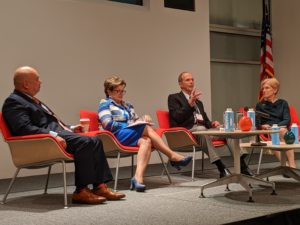
World Standards Week event examines collaborative solutions for the future workforce
 In a first of its kind collaborative event during World Standards Week, Workcred and the American National Standards Institute (ANSI) welcomed more than 150 guests for thought-provoking and engaging discussions — and several solutions — for Building an Effective Workforce for the Future.
In a first of its kind collaborative event during World Standards Week, Workcred and the American National Standards Institute (ANSI) welcomed more than 150 guests for thought-provoking and engaging discussions — and several solutions — for Building an Effective Workforce for the Future.
Fireside chat-style sessions brought together leading experts from companies, workforce-focused organizations, institutions of higher education, standardization organizations and other prominent organizations. Through interactive panels, sessions highlighted The Future of Work; New Credentials for the Future Workforce; Upskilling, Reskilling, and Retraining Today’s Workforce; and the Future of the Standards Workforce.
Sara Yerkes, senior vice president of government relations at the International Code Council, discussed the Code Council’s Safety 2.0 initiative to provide professional development through its High School Technical Training Program, which connects students to the International Residential Code in conjunction with construction trades training. The company’s Military Families Career Path Program helps veterans transition their skills, while the Code Council’s Board Shadow Program provides emerging professionals an opportunity to accompany the association’s board directors during its annual conference to experience real-time leadership.
While work and education have always been fundamentally linked, one of the elements that have shaped them both is technology. Special keynote speaker Patrick Gallagher, chancellor of the University of Pittsburgh and former acting deputy secretary and director of the National Institute of Standards and Technology in the U.S. Department of Commerce, explained that the speed of technology is simultaneously disrupting and creating jobs, and reshaping job competencies. And as employers try to keep pace with the change, they struggle with identifying required competencies for their workers.
“Transformative technologies such as artificial intelligence and the Internet of Things are dramatically reshaping industries, necessitating new skills and job roles, and requiring workers to reskill and upskill quickly,” said ANSI Chief Executive Officer and President, Joe Bhatia. “As future technologies bring new pressures on the labor market, lifelong learning and reskilling initiatives are key to assuring two key things: That individuals will be able to remain competitive in an ever-shifting labor market, and that businesses will be able to find the skilled talent they need.”






